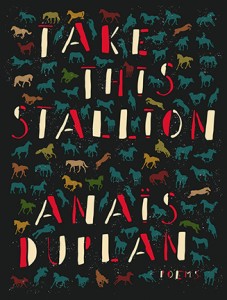Book Review
 Anaïs Duplan bares the most when it seems she’s not baring much. The opening poem in her first collection is a pop-culture apocalyptic feminist manifesto conversation. In it, she confesses to a seemingly simple fact:
Anaïs Duplan bares the most when it seems she’s not baring much. The opening poem in her first collection is a pop-culture apocalyptic feminist manifesto conversation. In it, she confesses to a seemingly simple fact:
I will always be a woman.
The simplicity of this line is beautiful and profound. The statement shoots in many directions. We don’t know what kind of woman she is, or wants to be, or feels trapped being, but she is certain that a woman is what she is. She continues with a galactic-celestial vision of this post-woman:
Even when I’m dead and made of stardust and then
even when I’m made of god dark god, I will still be
a woman just like Kim.
Kim, as in Kim Kardashian, has in this poem become a dystopian future of womanhood. It’s like Duplan is saying Kim is already “dead” and “made of stardust” and treated like a “dark god.” She teeters back and forth on whether Kim, or any celebrity or model, is the new “real” or a disappointing spin-off of what a real woman could be.
Just like the mission statement at the Center for Afrofuturist Studies which Duplan founded in Iowa City, the poem—and the whole book—becomes a space to “reimagine new futures for marginalized peoples.” Those peoples include ruined or tarnished celebrities (e.g. Martha Stewart, Kim Kardashian, Kanye West), women, and people of color. She writes about the one characteristic that will distinguish women of the future from women of the past, specifically future black women:
At least we have our authenticity. This is the last time
The first part of the line seems up-front and optimistic about authenticity, but also loaded with despair. If authenticity is such a virtue, is everything else fake? a lie? What could authenticity mean in a future where it is so rare? She pairs the statement with a dark one by continuing, “This is the last time.” With that enjambment, the line carries both yin and yang, both bright and dark. Why is it the last time to be authentic? She hints at the presence of some future, nonhuman being, like a robot. Is this, right now, truly our last time to be authentically human?
Duplan continues to probe authenticity throughout the book, specifically what it means to be a “real” woman. For instance, in her first long poem (it’s full of so many riches) she posts this ad, “WANTED:”
new self, must be beautiful
must be a real woman’s woman (cf. Kimberly Kardashian)
must be implacable
In these lines, she suggests that a future society (or is it ours?) demands beauty and some kind of animal stubbornness. The recipe for a woman also requires some very nasty bits:
must have heart as black as gangrene
must have sharp nails
These nasty parts hint at some beast, a satanic-like figure. Duplan chooses to write about this slow, menacing apocalypse, that “the world is dying,” with a tough touch. She introduces the term “Anthropocene” and I think it’s important she does. It’s a pop-science term for the epoch we are living in, “the age of humans,” named after all our carbon footprint climate crimes. She offers us the term as a kind of trendy buzzword:
They say Anthropocene,
Anthropocene. Anthropocene like it’s candy.
By saying it three times, “anthropocene” comes across as a kind of incantation for the ages. But by calling it “candy,” she suggests that the term, the epoch itself, has no real depth, is just another empty calorie.
It’s the end of the world, she seems to be saying, but that’s a good thing. We need everything to die to start all over. What is better than a new beginning? Duplan ends the book with a command for all time:
Do not waste time trying to find
beauty in all things. Reserve your awe
for mammals in flight.
She hints at women running away or flying away. I would say: Tell that horse to grow a pair. Of wings.
Overall, Duplan’s collection is complex but reader-friendly, kinetic, and ambitious but at times, refreshing and still. These are poems you think you understand, but you don’t. Not yet. They need to work on you.
About the Reviewer
Mollye Miller Shehadeh is a poet and photographer. At the New School (MFA 2009) she received the 2010 Chapbook Award for her manuscript "Shade Particles." In 2012 she won the Poets&Writers Maureen Egen Writers Exchange Award for her manuscript "What Was Done." Her poems appear in Prelude, Paperbag, Stop Sharpening Your Knives (S/S/Y/K), and elimae. She has two prior book reviews in the Colorado Review. She lives in Baltimore.